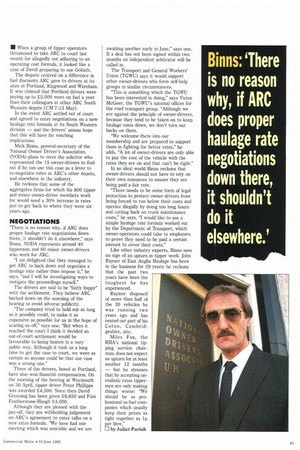• When a group of tipper operators threatened to take
Page 47

If you've noticed an error in this article please click here to report it so we can fix it.
ARC to court last month for allegedly not adhering to an operating cost formula, it looked like a case of David preparing to sue Goliath.
The dispute centred on a difference in fuel discounts ARC gave to drivers at its sites at Portland, Ringwood and Wareham. It was claimed that Portland drivers were paying up to £5,000 more on fuel a year than their colleagues at other ARC South Western depots (CM 7-13 May).
In the event ARC settled out of court and agreed to enter negotiations on a new haulage rate formula at its South Western division — and the drivers' unions hope that this will have far reaching implications.
Mick Binns, general-secretary of the National Owner Driver's Association, (NODA) plans to meet the solicitor who represented the 15 owner-drivers to find out if he can use this case as a lever to re-negotiate rates at ARC's other depots, and elsewhere in the industry.
He reckons that some of the aggregates firms for which his 800 tipper and mixer owner-driver members work for would need a 30% increase in rates just to get back to where they were six years ago.
NEGOTIATIONS
"There is no reason why, if ARC does proper haulage rate negotiations down there, it shouldn't do it elsewhere," says Binns. NODA represents around 40 tippermen and 60 mixer owner-drivers who work for ARC.
"I am delighted that they managed to get ARC to back down and negotiate a haulage rate rather than impose it," he says, "and I will be investigating ways to instigate the proceedings myself."
The drivers are said to be "fairly happy" with the settlement. They believe ARC backed down on the morning of the hearing to avoid adverse publicity.
"The company tried to hold out as long as it possibly could, to make it as expensive as possible for us in the hope of scaring us off," says one. "But when it reached the court I think it decided an out-of-court settlement would be favourable to being beaten in a very public way. Although it took us a long time to get the case to court, we were as certain as anyone could be that our case was a strong one."
Three of the drivers, based at Portland, have also won financial compensation. On the morning of the hearing at Weymouth on 30 April, tipper driver Peter Phillipps was awarded £4,500. Since then David Greening has been given £6,650 and Finn Featherstone-Haugh £4,000.
Although they are pleased with the pay-off, they are withholding judgement on ARC's agreement to enter talks on a new rates formula. "We have had one meeting which was amicable and we are awaiting another early in June," says one. If a deal has not been signed within two months an independent arbitrator will be called in.
The Transport and General Workers' Union (TGWU) says it would support other owner-drivers who form self-help groups in similar circumstances.
"This is something which the TGWU has been interested in doing," says Victor McGeer, the TGWU's national officer for the road transport group. "Although we are against the principle of owner-drivers, because they tend to be taken on to keep haulage rates down, we don't turn our backs on them.
"We welcome them into our membership and are prepared to support them in fighting for better rates," he adds. "A lot of owner-drivers are only able to pay the cost of the vehicle with the rates they are on and that can't be right." In an ideal world Binns reckons that owner-drivers should not have to rely on their own resources to ensure they are being paid a fair rate.
"There needs to be some form of legal protection to protect owner-drivers from being forced to run below their costs and operate illegally by doing too long hours and cutting back on truck maintenance costs," he says. "I would like to see a simple haulage rate formula worked out by the Department of Transport, which owner-operators could take to employers to prove they need to be paid a certain amount to cover their costs."
Like other industry experts, Binns sees no sign of an upturn in tipper work. John Rayner of East Anglia Haulage has been in the business for 29 years: he reckons that the past two years have been the toughest he has experienced.
Rayner disposed of more than half of the 20 vehicles he was running two years ago and has rented out part of his Coton, Cambridgeshire, site.
Miles Fox, the RHA's national tipping service chairman, does not expect an upturn for at least another 12 months — but he stresses that by accepting unrealistic rates tippermen are only making things worse: "We should be as professional as fuel companies which usually keep their prices as tight together as lp per litre."
by Juliet Parish














































































































